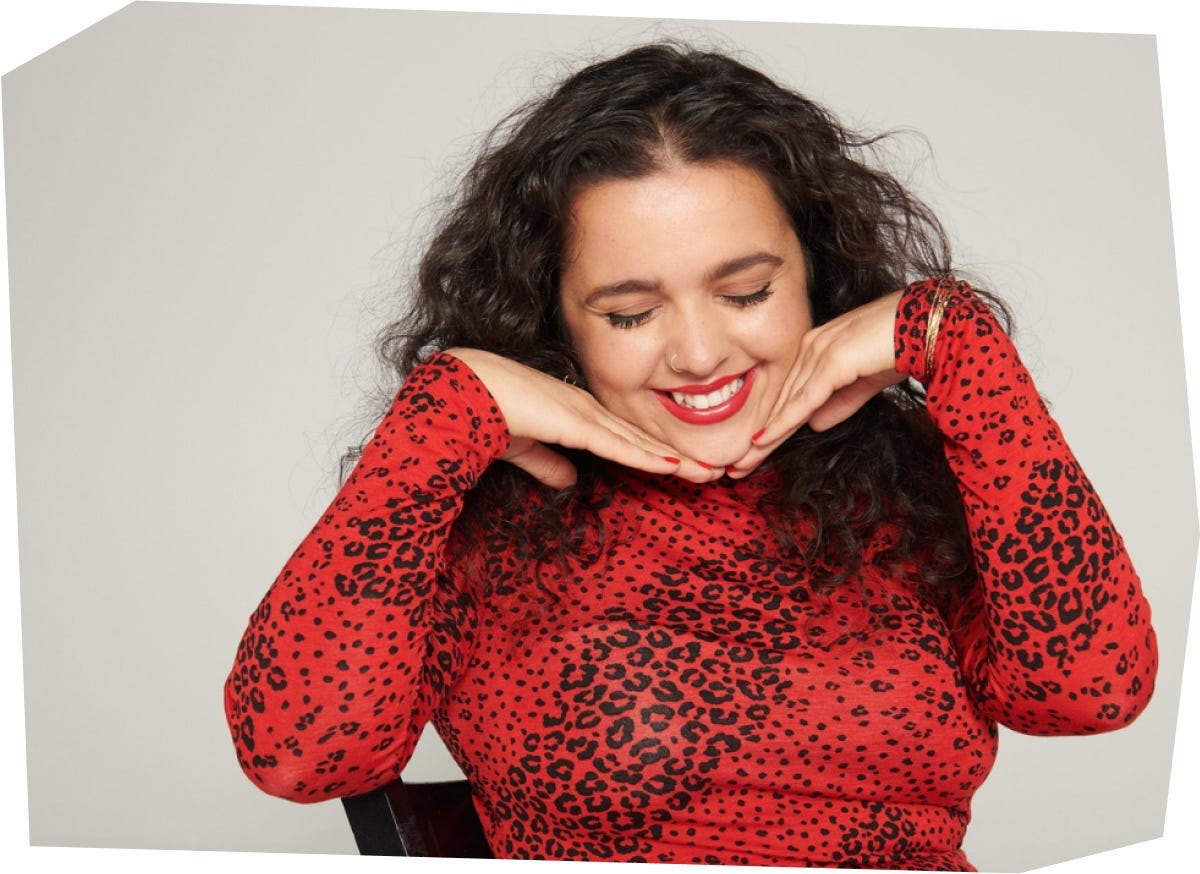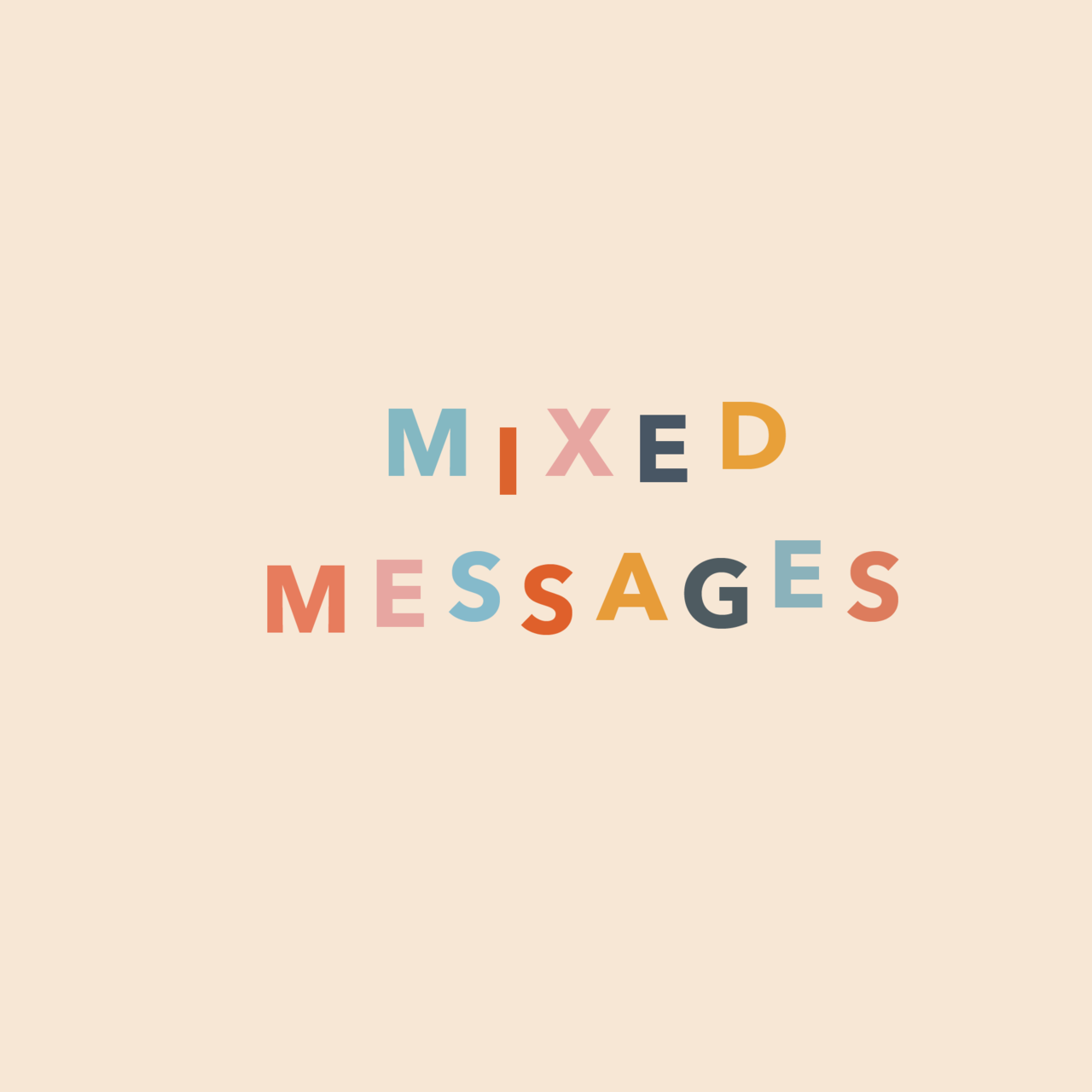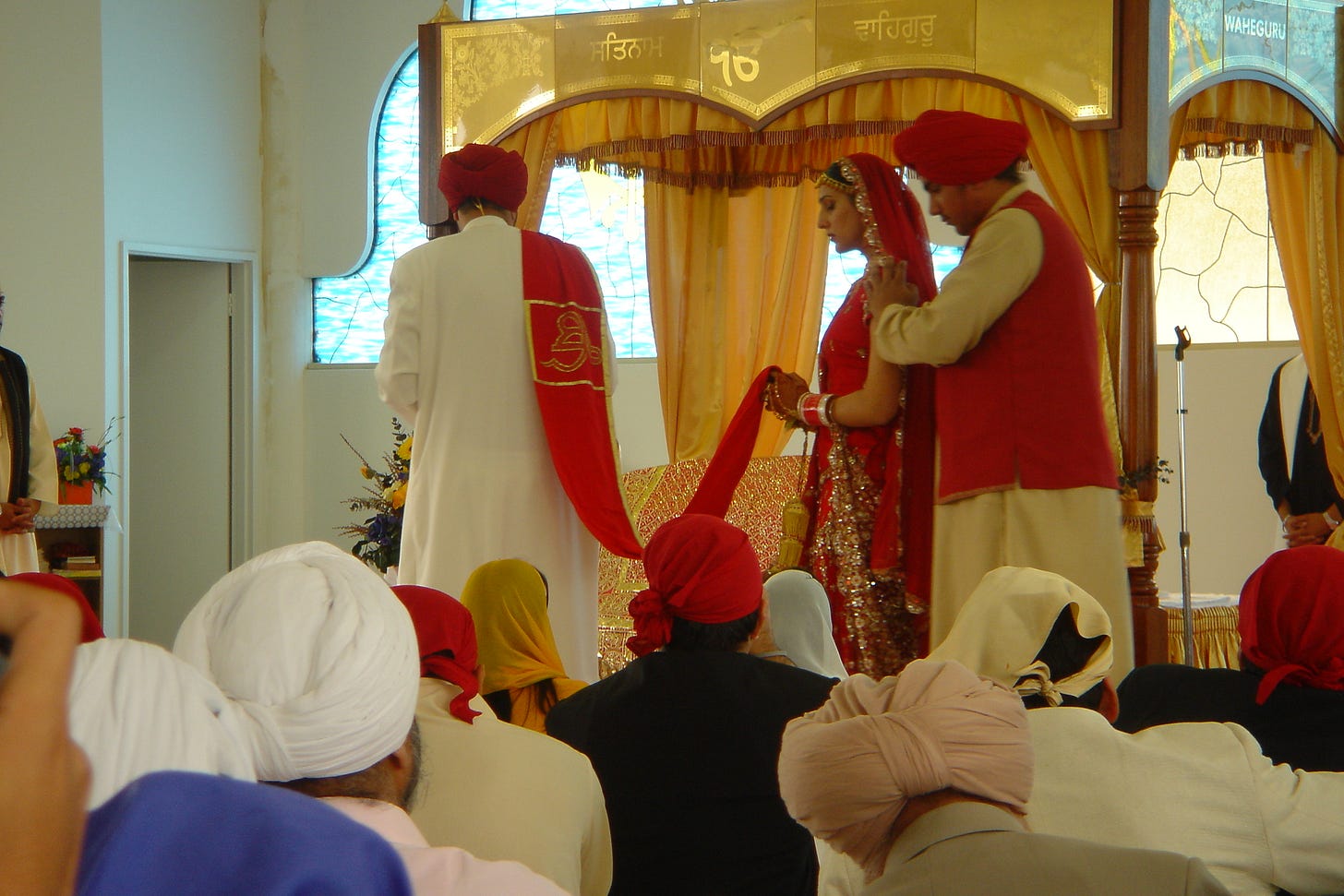Mixed messages
Journalist Isabella Silvers on how being mixed affects her love life
Everyone says it’s difficult to make friends as you get older. My suggestion? Start a Substack. Chatting to journalist Isabella Silvers was less like an interview and more like a catch up with a long lost friend. She writes one of my favourite newsletters, Mixed Messages, where she explores all the different ways of being mixed race. I’d very rarely heard the brown and white experience being discussed in public forums until I found her work.
Isabella and I have a pretty similar background in lots of ways: she’s half white on her dad’s side (like me) and half Indian Punjabi via East Africa on her mum’s side (my mum is Indian Gujarati via East Africa). Our grandparents moved to Hounslow in West London and we’ve both lived there with them at some point. But, by her own admission, even with all of our similarities, our mixed experience is still very different: “There’s no one way to be mixed,” she tells me. It’s this focus on nuance that makes Izzy’s newsletter such a good read week after week.
How do you identify?
You’re turning my questions back on me! I don't love race as a concept — it is a social construct — but people don’t understand just ‘mixed’ so I often add the race on to make it make sense for others. I’d say I'm half Indian but that's the short version of the story because my mum is Punjabi (which is a whole different thing to just Indian) and she was born in East Africa. I say mixed Indian. It’s not perfect but other options don’t feel like me: biracial feels like an American term and dual heritage feels too narrow. There’s also a debate around Anglo-Indian which has various meanings that I get confused about. I also say I’m brown but I use that more casually.
I struggle with which generation of immigrant I am because my mum moved when she was so young — she was born in Dar es Salaam and came here in 1966 when she was two years old. I’m second generation, I think.
I love how much thought you have put into this. Have you always related to those terms?
No. Growing up in Birmingham, half caste was the more common term. I think I used it until I was 10 or 11. I remember reading the poem Half-Caste by John Agard in English literature that mocks the use of the term — it's still one of my favourite poems. I then moved to mixed race and, as I mentioned, I now want to just say mixed.
Why did you start writing Mixed Messages?
My work has been focused on race and identity for a while. I was lucky that in the early days of my career I did the Creative Access internship scheme and, at the time, their masterclasses were solely focused on race. I then started to question the mixed experience: What does it all mean for us? Where are our voices in the conversation? When is it appropriate for us to speak up? When not? What conversations are we not having?
At the same time, I was watching the dating show Love Island. Girls were saying their type was ‘mixed race’. We all knew what they actually meant: light skinned Black men who are still cool and edgy because they’re Black but safe to take home because of their eurocentric features and proximity to whiteness. I hated the reduction to stereotypes. I hated that mixed race only meant Black and white. It’s true that, statistically, Black Caribbean and white is the most common mix in the UK but there are lots of other mixes too, with more on the rise. Selfishly, I wanted to understand where I came into all of this. That’s how the newsletter was born.
Interesting! You wrote a great piece about how considering mixed race people more attractive is rooted in racism. How’s that impacted you?
In Birmingham, there’s a big South Asian population. I never felt like I wasn’t attractive because of my colour. Yes, I was self conscious of having dark hair and light skin but my romantic interests never made an issue of it. A white boyfriend once mentioned that I had hair from my belly button downwards but he was like, “Oh, I don’t mind it.”
I sometimes wonder if my colour isn’t an issue because I am white presenting. But I really want people to see that I’m Punjabi and brown. I wear my heritage on my sleeve.
What’s your relationship like with your white side?
I’m having one of those days where I’m thinking about my nan who passed away recently. My white nan, Betty, was the one person in the family who loved me the most. She was my favourite and I was hers. I just really wanted her to see me get married but, as a friend said to me, how old did I want that woman to live!? She died at 94.
Honestly, I feel you. My Nanny just turned 90 and I feel the same thing. Did you feel pressure from her to get married?
Not at all! She would be like, “Bella (that’s what she called me), we need a billionaire for you.”
Although my Indian grandparents are quite liberal, I am feeling their gentle pressure to not leave it too late. They’ve even offered to put my details in the Gurdwara’s list of eligible singles! My biggest pressure though is time. I want them around for my wedding.
Would you let them share your details with the Gurdwara?
No. The only information these lists include is your degree. Pretty much anyone can get a degree these days! Plus, it makes me feel like a piece of meat being graded. If they were to give me more information about a boy — like what he does for work, his hobbies or other things we could connect over — then I’d have a real conversation with them about it.
I know it all comes from a good place because they want to see me settled. That’s their culture — it’s just different to how I was raised. They have supported me and let me do what I want, otherwise, especially in terms of my career.
I am trying to find someone though but us singles are facing a lot of nonsense out there. The other day I came across a man’s profile that said ‘no colours or ethnics.’ The expectation is that I’ll find a nice Indian boy but they also have issues.
Say more…
My ex, for example — my granny was his teacher at primary school and he lived on the road next to me growing up — ticked a lot of the brown boy stereotypes: he didn’t know how to cook and he didn’t want to move away from his mum. He was Muslim Pakistani and my family is Sikh which wasn’t an issue for us but it was a whole thing for our wider families. Throughout our relationship his family just thought we were friends. He’d lie to his mum about where he was and who with with. Eventually, that’s why we broke up. I couldn’t live like that. I needed him to get it together, be honest and stand up for our relationship. I don't know if he ever thought I’d break up with him and I think it made him realise that he could lose a lot more in life if he didn’t change. He’s now moved out, got his nose pierced — something he always wanted to do but his mum wasn’t a fan of — and has just become more independent from what I can see.
How do you feel about that?
It’s nice. He’s nice. I want him to be happy. But I’m also like, ‘you’re welcome’.
What are you looking for now?
I’m always thinking about my family who expect me to find a nice Indian boy. They can’t really say anything if I marry a white guy though — my dad is white! There’s a huge issue with anti-blackness in South Asian communities. There are huge issues with Islamophobia too. So, even though I’d be OK with anyone, it could potentially be an issue with my family. Plus, Gurdwaras don’t allow mixed marriages. So although I wouldn’t choose someone to appease my family, I’d have to be really be sure the fight for my partner to be accepted and the upheavel it might cause were worth it.
There's another layer of stuff at this point in my life too. I'm not sure if I want children. I have two Godchildren and I love more than life itself. I feel like if I did want kids I would have felt the urge after spending so much time with them. But, you know, I always say never say never. Not wanting them now, though, means I don’t have that element of time pressure to be with someone.
I also want to do things differently — and more true to me — when it comes to culture.
What does that mean to you?
I’d like to do my wedding differently. I do want a big Indian wedding, just done my way. In Sikh weddings, the groom holds a scarf over his shoulder which the bride holds while she stands behind him. He leads her around the Guru Granth Sahib three times. She is guided by her male cousins and relatives. I’m like, fuck that. If I’m going to do it, I want my female cousins and relatives with me.
I’d love my husband to take on my surname, too.
How are you finding the dating scene?
I don’t date a lot. It’s not because I don’t want to. I just don’t seem to be someone who men approach. I rarely get approached. On dating apps, I match with people who either don’t talk to me or if they do, they don’t want to go on a date.
I don’t know why. I say I’m white presenting and that it can’t be about race…but is it? I’m also into creative, artsy types who, generally, tend to be more left leaning and less racist. So it definitely can’t be about race?
Yet, I sometimes look at how my beautiful, white and blonde friends get approached. Yes, of course, they’re beautiful, intelligent and funny in their own right. But I do wonder what it is about me? I don’t think I’m ugly or unattractive (if you get me on the right day!) I think I’m interesting and have a lot to offer.
So what is it? And then I wonder about race.
Do you find it’s different when you meet in real life? Say at a work or social event?
I left dating apps six months ago. It was making me feel shit about myself — I was constantly comparing myself to other girls going on multiple dates.
I’m now trying to approach people in person. I'm terrified but I do go up to people and ask them out. Until a few weeks ago, I had a 100% rejection rate: some have been in relationships, some were gay and some were just not interested.
But yes, I find it easier once I build a connection with someone first. I think people are more attracted to me once they get to know me a bit more. I like it when you can keep bumping into the same person again and again like at a members club or workspace, instead of the pressure of seeing someone on a night out and knowing if you don’t speak now, it’s never going to happen.
Izzy, you’re a successful, strong, funny woman. Do you think intimidation is a part of this?
Look, I can’t divorce my personality from my race but I do agree that some men can be intimidated by someone outspoken or someone forthright asking them out. But I will keep trying.
My therapist asks me, “What hole would a man fill in your life?” and I’m like, “Well, Ms Therapist, there's a very specific hole a man would fill, thank you very much!” But no, I would like to have someone to do life with.
When do you first remember sex being a concept?
I can’t think of a single moment — it sort of seeps into your life and becomes something you know but don’t know how you know, you know? But, if I had to say, it may have been the TV show Sexcetra. It was definitely a late night show where they reported on the world of sex, from fetishes to trending toys.
I never had conversations with my parents about it. I think there was one conversation about periods with my mum. When I was young, I never got how people were having sex and their parents knew about it. People were having sex with their parents downstairs. You mad? Even crazier, parents would be like, “Oh yeah, my son’s got a girl over tonight.” Excuse the fuck me? I would be murdered. I didn’t even need the conversation to know it wasn’t allowed.
What do you wish you’d learnt?
As I got older and started working in women’s media spaces, like at Cosmopolitan magazine, I was having more open conversations with people and read a lot more on sex.
When I was younger, I wish there had been more education around contraception options, including hormonal options and the effects they have on women. I also wish we’d learnt about consent and boundaries and recognising assault and abortions. There’s this belief in our communities that kids are too young to learn this stuff. But, God forbid, something happens to a young kid, how will they know how to articulate what happened? How will they know that they were hurt?
Kids are having sex a lot younger. Shouldn’t we be arming them with information so that they’re safe? Shouldn’t we want to know where they are and who they’re with when they’re having sex? Yes, I can imagine it must be weird for a parent but wouldn’t you rather know they were in a safe environment and using protection? When my Godchildren are older I want to be someone they can go to about anything. I want them to know they always have someone to turn to and they can trust.





Can you or Ms. Silvers refer me to a source that elaborates on her point that race "is a social construct"?